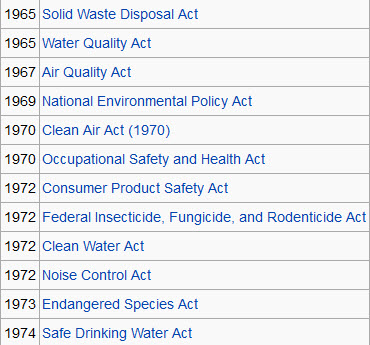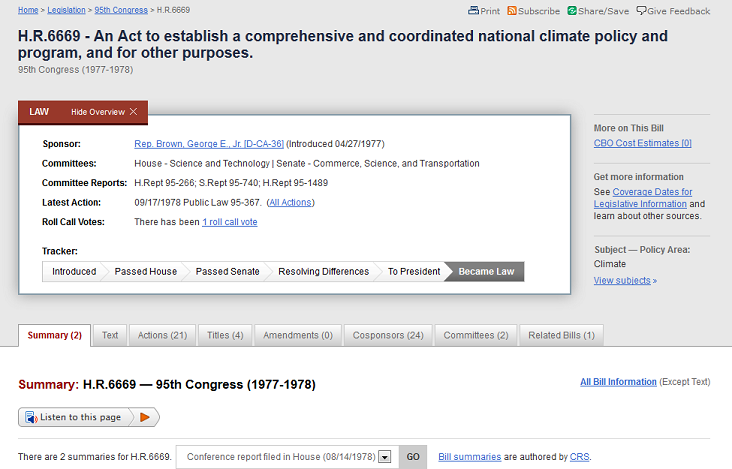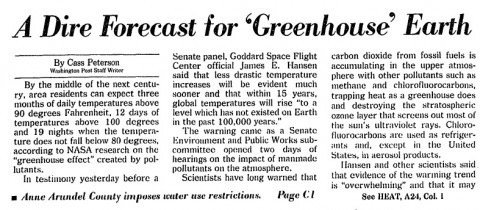Ethics and Climate Change
>Via the Ethics Institute at Penn State College of the Liberal Arts
In 1977, Robert M. White, the head of the National Oceanic and Atmospheric Administration, wrote a report for the National Research Council a branch of the National Academy of Sciences that concluded that CO2 released during the burning of fossil fuel could have consequences for climate that pose a considerable threat to future society. (White, 1978)
A report prepared by the Carter administration a few years later in 1981 declared that "[t]he responsibility of the carbon-dioxide problem is ours-we should accept it and act in a way that recognizes our role as trustees for future generations." (Charney et al., 1979) This report also estimated that the amount of warming that would be experienced from a doubling of the pre-industrial levels of CO2 would be 3 degrees C, very close to the amount that Intergovernmental Panel on Climate Change would predict almost 30 years later." (Charney et al., 1979)
For over thirty-five years, the US Academy of Sciences has warned the US about the enormous threats of climate change with each successive report making stronger claims that human caused climate change is a serious threat to civilization. If the United States can be accused of failing to live up to its ethical responsibilities to the rest of the world on climate change, one cannot blame the US Academy of Sciences for failing to ring alarm bells. US citizens cannot claim that their most prestigious scientific institutions have failed to take a position on the seriousness of climate change.
ClimateEthics has previously explained that that the failure of the United States to respond to climate change can be attributed in largest part to a well-financed, well-organized climate change disinformation campaign. See, for example, A New Kind of Crime Against Humanity?:The Fossil Fuel Industry's Disinformation Campaign On Climate Change. (Brown, 2010a) ClimateEthics has also repeatedly argued that the failure of the United States to respond to its ethical duties for climate change may also be attributed to the almost complete failure in the United States of the media and even climate change policy advocates to acknowledge that climate change raises not only national interests but also duties, responsibilities, and obligations to others. See, for example, Are Ethical Arguments for Climate Change Action Weaker Than Self-Interest Based Arguments? Why Taking Ethical Arguments Off the Table Is Like A Soccer Team Unilaterally Taking The Goalie Out of the Net. (Brown, 2010b)
Ethics and The National Academy of Sciences
If climate change must be understood as a civilization challenging ethical issue, can the US Academy reports on climate change be criticized on ethical grounds?
The US Academy reports acknowledge that climate change has serious adverse world-wide impacts, that is impacts outside the United States. For instance, in its most recent report, the US Academy concluded that climate change would cause the following world-wide impacts:
• Water availability will decrease in many areas that are already drought-prone and in areas where rivers are fed by glaciers or snowpack;
• A higher fraction of rainfall will fall in the form of heavy precipitation, increasing the risk of flooding and, in some regions, the spread of water-borne illness;
• People and ecosystems in coastal zones will be exposed to higher storm surges, intrusion of salt water into freshwater aquifers, and other risks as sea levels rise;
• Coral reefs will experience widespread bleaching as a result of increasing temperatures, rising sea levels, and ocean acidification.
○
Read more re: the beginning of the modern environmental era and climate change study and science
- In the UK
- https://www.wired.com/story/meet-the-amateur-scientist-who-discovered-climate-change/ -- About Guy Callendar
- 'In the US
- http://www.greenpolicy360.net/w/File:US_Public_Law_95-367.png -- At the beginning of climate studies...
- http://www.greenpolicy360.net/mw/images/National_Climate_Program_Act_Public_Law_95-367_Sept_1978.pdf
○
Congressman Brown / Science Committee in Front of Climate Action
http://www.greenpolicy360.net/w/File:Congressman_george.e.brown.gif
National Climate Program Act, 1978 / PDF
- The first federal program established to study and assess scientifically the issues and risks of human-caused climate change
○
Energy and Climate Report, 1977, National Academy of Sciences / 175 pp. / PDF via GreenPolicy360
○
James Hansen's Warning to Congress in 1988:
- Ten years after the National Climate Program Act was drafted by Representative Brown and the legislation's passage led by the Congressman began the federal government's study of climate change, impacts and risks.
- http://www.greenpolicy360.net/w/File:Hansen-testimony-1988.jpg
○
- Anthropocene
- Arctic
- Atmospheric Science
- Climate Change
- Climate Policy
- Desertification
- Digital Citizen
- Earth Observations
- Earth360
- Earth Science
- Earth Science from Space
- Ecology Studies
- Eco-nomics
- Education
- Energy
- Environmental Laws
- Environmental Protection
- Environmental Security
- Environmental Security, National Security
- Extinction
- Greenland
- Global Security
- Global Warming
- Green Networking
- Green Politics
- INDC
- NASA
- NOAA
- Natural Resources
- Networking
- New Definitions of National Security
- Ocean Science
- Planet Citizen
- Renewable Energy
- Resilience
- Sea-level Rise
- Sea-Level Rise & Mitigation
- Solar Energy
- Strategic Demands
- Sustainability Policies
- US
- US Environmental Protection Agency
- Whole Earth
- Wind Energy


